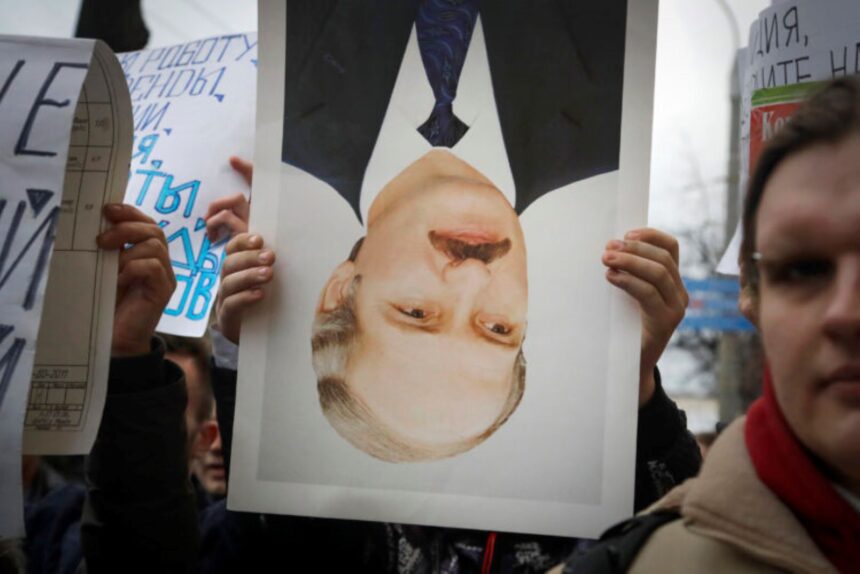Belarus Hybrid Warfare: How Lukashenko Weaponized Migration Against the EU
Documents and intercepted phone calls revealed by Politico expose how Belarusian President Alexander Lukashenko’s regime used migration as a strategic tool to undermine the European Union. The Belarusian government’s directives were clear – allow migrants to enter Europe.
In May 2021, Ihar Kačalau, deputy head of the criminal police in the Minsk region, received reports about the disappearance of several people who had traveled to Belarus from Africa to learn football. Kačalau reached out to the Ministry of Internal Affairs for guidance, as detailed in an intercepted phone call published by Politico.
“Don’t worry about the migrants transiting to Europe,” said Mikhail Bedunkevich, a senior official in the Ministry of Internal Affairs, in the intercepted call. After a pause, he added: “Missing? As long as they don’t settle here, everything’s fine. We shouldn’t stand in their way.”
This phone call, which lasted under two minutes, is part of a larger cache of intercepted communications and documents that show how Belarus allowed and even facilitated migrants to enter the country and illegally cross into the EU. This was part of a broader hybrid warfare strategy designed to sow political discord in EU countries.
The plan began in the spring of 2021 after Belarus faced sanctions for its violent crackdown on protests following controversial presidential elections, which Lukashenko claimed as a sixth mandate. According to the leaked documents, Belarusian security forces coordinated with state-controlled travel agencies and hotels to facilitate the movement of migrants.
In retaliation for EU sanctions, Lukashenko’s government began to weaponize migration, funneling people into Belarus with the explicit intention of pushing them into the EU. Over 120 people have died along Belarus’s borders with Poland, Lithuania, and Latvia, according to the Human Constant group. European border guards, including Poland, have been accused of illegally pushing migrants back.
“The situation is clear — this is Lukashenko’s revenge for the sanctions. It will continue as long as the EU reacts to the atrocities in Belarus,” said Aleha, a border guard, to Politico.
Lukashenko’s hybrid warfare strategy escalated after the EU imposed sanctions in response to his controversial re-election and the violent crackdown on protests. In May 2021, Lukashenko ordered military planes to force a Ryanair flight carrying opposition blogger Roman Protasevich to land in Minsk, a move that further strained EU-Belarus relations.
When the EU responded with a sanctions package, Lukashenko vowed to end Belarus’s efforts to curb the flow of narcotics and migrants into the EU. But it seems he did much more than that.
In countries like Iraq, advertisements were placed promoting travel to Belarus. When potential migrants showed interest, travel agencies would submit petitions to the Belarusian Ministry of Foreign Affairs, requesting short-term visas for reasons like employment, tourism, hunting, and medical treatment. Group visas were frequently issued, often with the unofficial promise of an easy passage to the EU.
Migrants paid between $6,000 and $15,000 for flights with airlines like Fly Baghdad, Iraqi Airways, and Belarus’s state-owned Belavia. Upon arrival, they were greeted by representatives of travel companies and taken to hotels owned by the Presidential Property Management Directorate, an entity directly controlled by Lukashenko. While tourists were offered legitimate tours and activities like hunting, spa visits, and circus outings, it was clear that many had no interest in these activities. They came to Belarus with the aim of entering the EU.
In an intercepted conversation, Dzmitrij Korabau, deputy head of the private tourist agency Oskartur, remarked that migrants arrived in Minsk “without bags.” He also joked that planes returning to their home countries were “half-empty.”
Despite the apparent cooperation between Belarusian tourism agencies and state security forces, the operation went largely unnoticed until the summer of 2021, when reports emerged about a growing number of foreigners appearing in the streets of Minsk. This prompted a further investigation into the involvement of Tsentrkurort, a state tourism company linked to the Presidential Property Management Directorate.
Eventually, Belarusian authorities were directly implicated in facilitating illegal migration, with border guards actively helping migrants reach EU borders. By the fall of 2021, it was clear that Lukashenko had orchestrated the entire scheme as part of his ongoing retaliatory tactics against the EU.
Polish, Lithuanian, and Latvian border authorities reported numerous incidents involving migrants attempting to cross the border. In some cases, they were forcibly returned to Belarus, where they were detained and mistreated.
This hybrid warfare operation, designed to destabilize the EU and sow division, highlights the lengths to which Lukashenko’s regime is willing to go in retaliation for international sanctions and political isolation.







